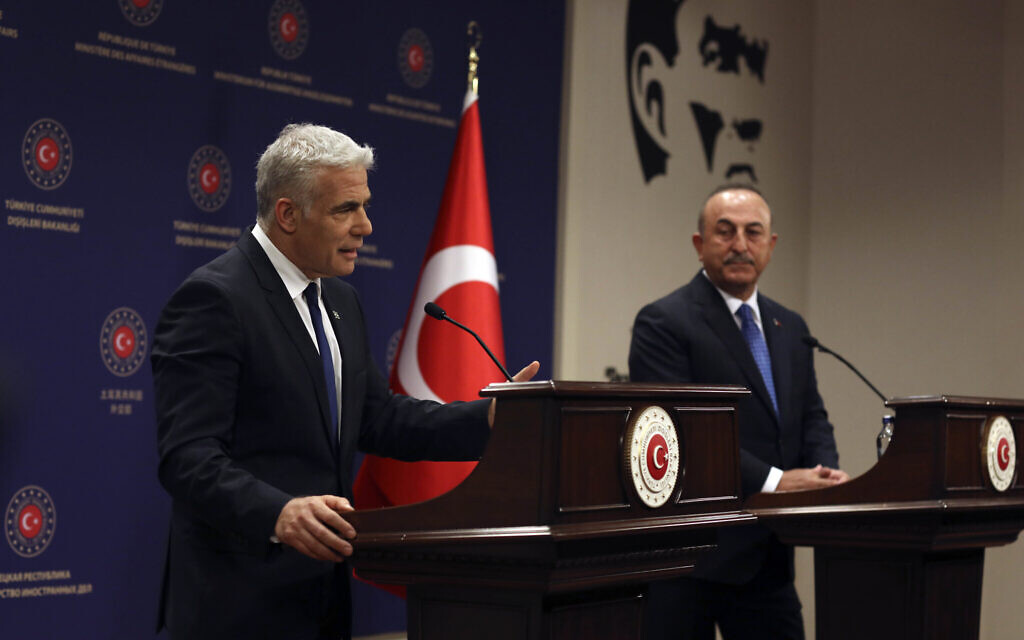Israel eases Istanbul travel warning, but says threat remains throughout Turkey
Israel eased its elevated travel warning to Istanbul on Tuesday, returning it to Level 3, or moderate, for all of Turkey, after it had been at its highest level for the country’s largest city due to threats from Iran against Israeli civilians.
The National Security Council Counter-Terrorism Bureau said in a statement that arrests and counter-terror operations against Iranian-backed operatives led to the reduced travel warning.
Under the Level 3 warning, Israelis are advised to avoid all non-essential travel to Turkey.
The elevated travel warning, which called on citizens to avoid travel to Istanbul for any reason, had been in place since June 13.
“It’s a return to the situation we knew several weeks ago,” said Yossi Adler, senior director for Intelligence at National Security Council, in a briefing to Israeli diplomatic reporters.
The NSC warned that Iran’s motivation to carry out attacks remains high, and that it assesses that “there are efforts to build infrastructure on the one hand and identify potential Israeli and Jewish targets on the other hand.”
Israelis are being asked to avoid publicizing details of upcoming trips to Turkey and photos while they are still in the country; to avoid wearing any clothes that could indicate they are from Israel; and to refrain from giving personal details to and having unnecessary contact with strangers.

Prime Minister Naftali Bennett (L) and Turkish President Recep Tayyip Erdogan. (Composite/AP)
Prime Minister Naftali Bennett thanked Turkish President Recep Tayyip Erdogan and Turkey’s security forces for foiling attempts by Iran to attack Israeli travelers.
“Our activities were successful, and succeeded in protecting human life,” said Bennett. “We will gradually return to normal.”
According to senior Israeli officials, significant intelligence had indicated that Iran was seeking to carry out attacks against Israeli tourists in the country to avenge a series of killings and strikes on Iranian military and nuclear targets that have been attributed to the Jewish state.
Adler underscored that recent reports in Israeli media that the warning had remained in place due to unspecified bureaucracy, despite a decision to lift it, were baseless.
“We didn’t hurry to remove it because we treated the area like a minefield,” he explained. “Before people started walking around that area, we had to do extensive and deeper checks.”
The threat was “significant, immediate, and widespread,” according to Adler.
Officials in both countries had indicated recently that they were seeking to have the restriction lifted in time for the summer travel season.
Adler expressed satisfaction with Israelis’ responsiveness to the warning, saying that there had been a noticeable reduction in the number of Israelis seeking to fly to Istanbul.
Turkish security forces arrested a number of suspects in recent weeks, including Turkish citizens, said Adler, adding that information gleaned from the Turkish arrests was still being processed.
Israeli officials have indicated that while the recent arrest of Iranian agents accused of plotting against Israelis has lowered the level of danger, Turkey is still not totally safe for Israeli tourists, and it is not known whether elements of the warning will remain in place.
On Sunday, the government said that it hoped to be able to change the instructions soon so that Israelis would be able to travel to the popular destination “without fear.”
During a visit to Ankara last Thursday, Foreign Minister Yair Lapid said Israel was looking to lift the warning, which had threatened to upend the delicate resumption of diplomatic ties between Israel and Turkey.

Turkish authorities arrest an alleged Iranian cell that sought to target Israelis in Istanbul on June 23, 2022. (Screen capture/CNN Turkey)
A senior security official briefing Hebrew media on Friday said that the Mossad and local counterparts thwarted three Iranian attacks targeting Israeli civilians in Istanbul in recent days.
The security official said Mossad intelligence had led Turkish authorities to 10 members of an Iranian cell who were allegedly planning to kidnap and murder a former Israeli ambassador to Turkey and his wife. The 10 were arrested Thursday, the official said.
Israel’s Mossad spy agency chartered private aircraft to immediately bring the pair and others in Istanbul back to the country, Hebrew reports said. The name of the diplomat has not yet been released.
According to the official, the Mossad managed to thwart two other plots against Israelis in Istanbul in recent days as well, with the tourists escaping the country at the “last possible second.”
Iran’s Foreign Ministry spokesperson Saeed Khatibzadeh denied Jerusalem’s warnings of a Tehran-directed plot in Turkey, calling the claims “baseless” and part of a “pre-designed scenario to destroy relations between the two Muslim countries.”
An Israeli Foreign Ministry spokesman responded on Twitter: “For several weeks now, Iranian terrorist cells have been trying to assassinate innocent Israelis on Turkish soil at the direction of Iran’s terrorist government.”

Mourners gather around the coffin of Iran’s Revolutionary Guards colonel Sayyad Khodaei during a funeral procession at Imam Hussein square in the capital Tehran, on May 24, 2022. (Atta Kenare/AFP)
Iran and Israel have been engaged in a years-long shadow war, but tensions have ratcheted up following a string of high-profile incidents Tehran has blamed on Israel.
The Islamic Republic claimed Israel was responsible for the killing of Revolutionary Guards Colonel Hassan Sayyad Khodaei in his Tehran home on May 22. Khodaei’s assassination was the most high-profile killing inside Iran since the November 2020 killing of top nuclear scientist Mohsen Fakhrizadeh.
Last week, Iran’s elite Islamic Revolutionary Guards Corps, which also handles operations outside of the country, announced that it was replacing the head of its intelligence unit, Hossein Taeb, who held the position for over a decade.
Taeb has been repeatedly named in Hebrew media reports as the man behind the planned attacks on Israelis in Turkey.
Guards commander Major General Hossein Salami appointed General Mohammad Kazemi to head the intelligence unit instead, Iran’s Tasnim news agency reported.



/cloudfront-us-east-2.images.arcpublishing.com/reuters/CDZ7G72CBFMNTCTTZBBGDHM5RM.jpg)
